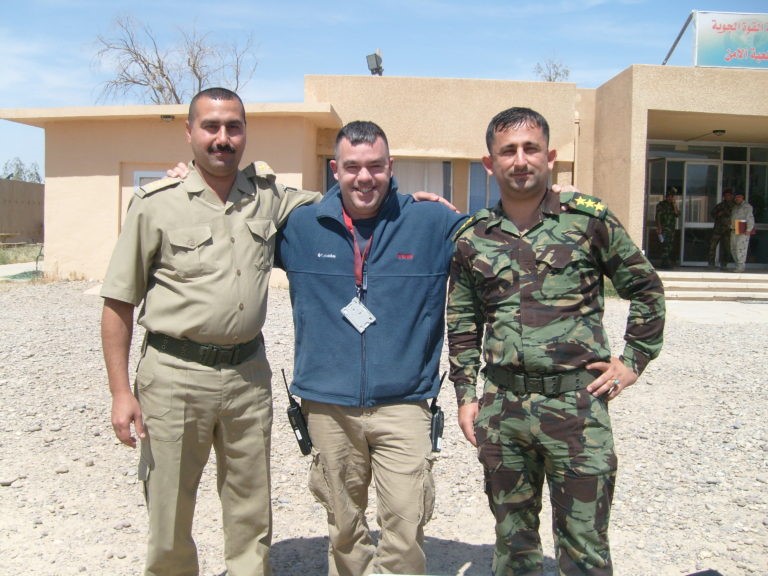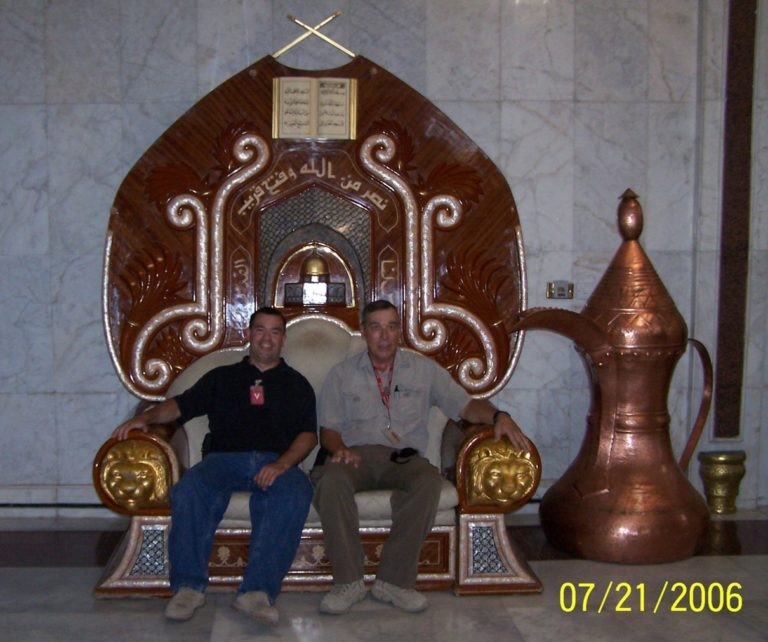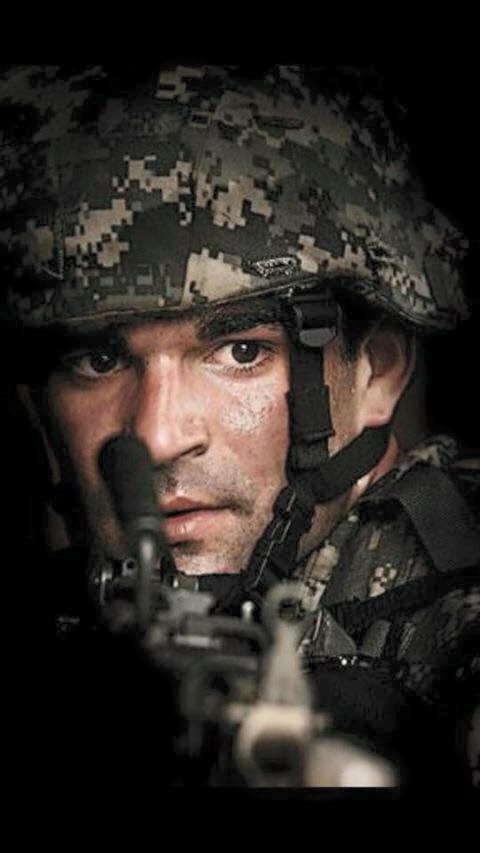
Gustavo Diaz is a good friend and, to me, embodies the American dream. He’s a great person to start a series of profiles of American Soldiers. Diaz, who prefers to use his last name, was born in rural Cuba to a family with limited means. His family had owned land that was seized by the communist government. “We were peasants”, he jokes. At the age of 13, he moved to Havana where he remembers being impressed with brick buildings that had electricity.
A few years later, the Cuban government began allowing people whom it considered undesirable to leave the country. Diaz’s uncles were imprisoned, and his mother and aunt applied to emigrate. They came to Wyoming, Michigan.
High school was a challenge for a new immigrant who spoke no English. After a while, Diaz realized many of the comments directed his way were not positive. He fought much, though he did well as a wrestler. Eventually Diaz was sent to an alternative school, where his grades improved and he graduated.
After high school, he stayed with the same group of friends who lacked direction. However, “I was never lazy; always had a job”, he mentions. Diaz worked as a chef for few years, then went to a factory where he was promoted rapidly from quality inspection to materials handler (hi lo driver). He made good money but spent it partying.
The party ended with a DUI conviction. While in jail, he met a Soldier who had been a tanker. “In reality he was more an infantryman”, says Diaz. It’s a telling statement: on the surface, Diaz is referring to the more visceral nature of infantry. His meaning is subtler, though, and shares a theme expressed by many Soldiers who have seen what people can do to each other, and parts of the world much harsher than America. Diaz means accepting and appreciating people as they are and, secondarily, taking opportunities for fun in a brutish and short world.
Diaz and the tanker sat in the rural Michigan jail with a lot of time together. They shared life stories. Diaz left jail determined not to go back, and intending to join the military.
First, Diaz went to the Marine recruiter. He took the ASVAB (Armed Services Vocational Aptitude Battery) test. He scored well on math, but his English held back his overall score. This is rather comical as anyone who meets Diaz sees he’s quite intelligent. He’s not the kind of person who accepts defeat, so Diaz signed up for Grand Rapids Community College.
College courses helped Diaz’s language skills. He went to the Army recruiter, still wanting to be a tanker. When he walked in, Diaz saw a poster of paratrooper. He changed his mind and signed a contract that day.
Diaz enjoyed Basic Combat Training and AIT (Advanced Individual Training) as an infantryman. He went directly to Airborne School. However, he had no orders to a unit. He asked a Black Hat-an Airborne instructor-for help. Here, he makes a gesture referring to a big person. I think back to my own time at Airborne School: just where did the Army find all these super-squared away, ultra-professional, 6’10”, rock-hard African American non-commissioned officers (sergeants)? They were scary as hell, even if the school was easy. Anyway, the Black Hat told him to stand tight, and somehow came back almost immediately with orders to one of the US Army’s legendary units: the 173rd Airborne, also called The Herd.
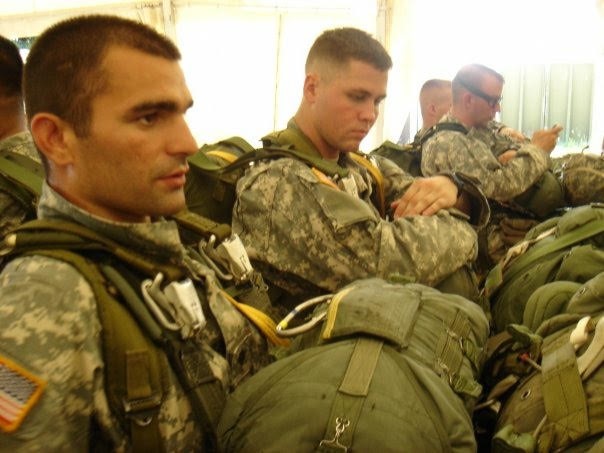
Arrival in Vincenza, Italy was blunt: he was sub-human until he proved himself. “They treated me like a junkyard dog”, Diaz shares; just about everyone who knows him appreciates Diaz’s mangled Spanglish analogies. He says people from the unit like to call it the “lost Ranger Bat(tallion)”, as its isolated location enables perpetuating a ferocious culture not unlike the 75th Ranger Regiment, and because almost all leaders are Ranger-qualified (meaning they completed Ranger School, rather than serving in the 75th Ranger Regiment).
His unit deployed to Kunar province in northeast Afghanistan. Many people know the region for the “Restrepo” documentary. Diaz shifts to an understated approach. I know he’s seen more combat than just about any of my friends. And-incredibly-two Soldiers from one company in the 173rd were awarded the Medal of Honor. This is a distinguished team of warriors. However, he plays down the intensity of combat. The impression is that extended combat is not a positive; it’s something to execute professionally, but a humanitarian failure in Diaz’s mind.
I try to steer the conversation to an epic battle. He doesn’t view it that way. His unit clearly fought hard. They were the QRF, or Quick Reaction Force for the province. They were sent to an isolated, small Forward Operating Base that required first a week’s convoy from Kandahar to Langman, then another seven days winding through the mountains to the remote Kagaran Valley. They were only in country for a few weeks when their battalion’s Scout Platoon was in a tough fight, and the QRF was sent to help.
Diaz recalls bullets pinging off the bottom of the big Chinook helicopter as they came in. He was in the back of the helicopter looking out as it started to land. A Taliban fighter launched an RPG at the helicopter. Diaz saw the rotor wash from the helicopter deflect the RPG just before the helicopter landed. They threw body bags full of ammunition, then dashed out.
The fight took a day and a half. The Soldiers were exhausted. Diaz doesn’t view it so much as a victory, though it was, but sees the human cost: a few Americans were injured, and 80 Taliban lay dead.
Diaz’s unit fought constantly. They cycled through about seven to ten days patrolling the mountains, and generally then three days in a FOB (Forward Operating Base). Diaz remembers going essentially a year on 3-4 hours of sleep per night. Whether patrolling, or in their meager plywood FOB, his gun team of three people would split about 5-6 hours of sleep per night with rotating on watch. While at the FOB, the Taliban fired mortars and rockets nearly every day. Even now, Diaz has mentioned a few times that he’s more afraid of mortars, which are only detectable in the final seconds before impact, compared to rifle fire, where a Soldier can sense the direction and fight back.
Winters brought calm to Afghanistan. Diaz’s unit sent veterinarians to villages, offered food to villagers, and provided medical care. He’s notably enthusiastic about this side of how America projects strength.
However, Diaz senses his upbeat message and then shares that one of his best friends died: Christopher Palmer, who fought in Iraq with the 101st Airborne, then fought and died in Afghanistan to a dishonorable enemy: an IED. When the 173rd returned to Italy, five of Diaz’s colleagues had lost their lives.
Diaz mentions the enemy taking pot shots: they couldn’t close with the Americans, who would destroy them in direct combat, so the Taliban would fight asymmetrically with IEDs or sneaky shots followed by scurrying away. The Americans found this repugnant, and wished the Taliban would stand and fight.
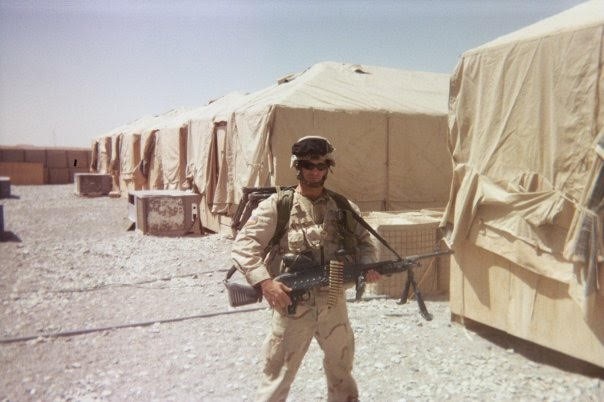
Diaz fought many battles, but does not want to continue this thread. He shifts to his second deployment, with the well-respected C/1-125 IN company of the Michigan Army National Guard. They deployed to Kunduz, Afghanistan. However, his unit deployed heavily over-strength-the National Guard is a strong presence in Michigan-which Diaz believes led to their being split up when they arrived in country.
Diaz spent much of his time in a static guard post. He compares it to solitary confinement. I asked if they got a less attractive mission because they were National Guard rather than active duty. Diaz responds no: other units that were part of this broader group were assigned combat missions. He emphasizes that his company was composed of experienced Iraq combat veterans. They were eventually put in another QRF role, but he fought less than his first deployment.
Diaz says leaving active duty is the biggest regret of his life. The story involves an Italian girl, and maybe others, but it’s not a topic to press. He joined the State of Michigan government as a social worker helping veterans. It’s a continuum shared with many Soldiers: working with and fighting alongside locals-Diaz fought with ANA, or Afghanistan National Army-shares much with social work.
Diaz thrived as a social worker. He enjoyed finding veterans he could help, particularly when they had sealed themselves off from society. He excelled at finding them jobs. He later was named to county and regional NGO boards, and surprised himself at doing well navigating the complex relationships between federal grants, state administration, and county oversight of the non-profits organizations that implemented programs.
A key federal grant involved funding training veterans for jobs that somehow helped the environment. Initially, Diaz and his colleagues were frustrated. However, they made the case that CDL training for truck drivers including learning GPS routing systems that improved gas efficiency. The proposal was approved, and his team enabled jobs for many veterans during the 2008-2009 recession.
Diaz was promoted to move to Lansing, the state capitol. However, he grew frustrated with what he found to be the insular and politicized nature of state government, and the high overhead cost across numerous layers of government compared to directly helping veterans.
Operating a business always appealed to Diaz. He joined Sherwin-Williams. Today, Diaz runs an independent store with well over $1 million in sales. He has differentiated his business by building relationships with contractors including Mexican builders, as he is one of the only bilingual people in his field in West Michigan. Diaz speaks now about achieving his P&L targets and building his business. He recently bought an abandoned house on a lake and started an ambitious remodeling project.
Diaz isn’t nearly done. He just completed the Senior Leader Course to qualify for promotion to Sergeant First Class, or E7. Diaz has served at times as a platoon sergeant, an E7 job, due to his competency, but welcomes the promotion. He is a warm, empathetic person who is gifted at mentoring junior Soldiers and helping others as a social worker. Fighting and winning sets the conditions to help others in Diaz’s way of thinking: he’s a professional Soldier who lives American values.
